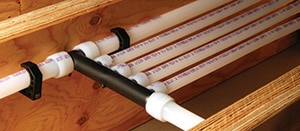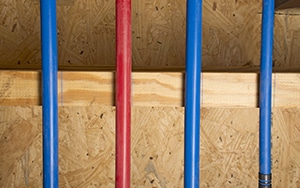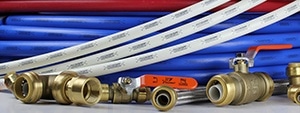Classification of PEX by Manufacturing Process
Regardless of brand, there are only (3) main manufacturing processes used to produce PEX tubing:
- Peroxide method (used to make PEX-A tubing)
- Silane method (for PEX-B tubing)
- Irradiation method (for PEX-C)
Contrary to the popular belief, A, B and C are not grades of PEX. These letters are used merely to identify the manufacturing process and have nothing to do with quality or performance ratings of the end product except as explained further in text.

In fact, all of the above have to adhere to the same standard:
- Pressure and temperature ratings
- Minimum bending radius
- Pipe wall thickness and ID/OD dimensions (subject to manufacturing tolerances)
* Note that these only apply to brands sold in the US and mentioned below. There are many little-known or no-brand products out there which may or may not meet these criteria.
PEX
PEX tubing is produced using Peroxide (or, “Engel”) method, named after the inventor Tomas Engel. During the manufacturing process, free radicals are created when Polyethylene polymer is melted and polymer is melted and cross-links between molecules occur at temperatures that exceed the decomposition temperature of the polymer which creates LDPE (low-density polyethylene). This type of PEX is probably the most common and is manufactured by a large number of companies.
Manufactures:
- Zurn
PEX-B
PEX-B is made using a “Silane” or “Moisture Cure” method of cross-linking, where links between the molecules of the Polyethylene polymer are formed after the extrusion process using a catalyst and by exposing PEX tubing to water (steam bath) which creates HDPE (high-density polyethylene).
Manufacturers:
- Zurn
PEX-C
PEX-C pipe is manufactured using “Electronic Irradiation” method of cross-linking, also known as “Cold” cross-linking. Here, cross-linking of the molecules is done after the process of extrusion by exposing the pipe to an electron radiation beam. The radiation emitted allows to break the existing links between molecules of the polymer and initiate cross-linking process which creates LDPE (low-density polyethylene).
- Shark Bite
Comparing the end product
| Pros |
Cons |
|
PEX |
Highest flexibility (softness) among all PEX types. Kinks can be repaired with a heat gun. Most readily available to purchase. |
Lower bursting pressure than PEX-B. Residual or leaching chemicals from manufacturing process. Variation in wall thickness. Highest degree of cross-linking. Low burst pressure. |
PEX-B |
Highest chlorine and oxidative resistance Highest bursting pressure. No leaching chemicals from manufacturing process. High burst pressure. Lowest dimensional tolerances variations. Lower cross-linking ratio than PEX-A. |
Stiffer than PEX-A. Noticeable coil memory. Kinks can only be repaired by splicing (using coupling). |
PEX-C |
Softer than PEX-B. More environmentally-friendly to manufacture. Little or no coil memory. There’s very little data available on PEX-C tubing to allow for competitive analysis. |
Prone to development of cracks. Least-uniform cross-linking. Least resistance to kinks, which are repairable only with a coupling. Low burst pressure. |
Which PEX tubing to choose?

Downsides to this type is a high rate of chemical leaching – from 50% to over 200% higher than PEX-B, which is a major concern for plumbing applications.
While a leading PEX manufacturer claims that their tubing has highest resistance to crack propagation, independent testing shows that PEX-B actually shows higher resistance to long-term oxidation which appears to be the primary reason for crack formation in the pipes and their subsequent failure.
A lower bending radius in PEX (6 times the OD vs. 8 times the OD for PEX-B & C) is helpful, but offers little practical advantage in most cases.

The major downside of PEX-B is its’ stiffness and coil memory (tendency to return to the original shape of coil). While there’s little difference in smaller sizes such as 1/2″, larger pipe diameters, especially 1”, can be noticeably harder to bend. Any kinks (which are very rare in our experience, but still occur) made during the installation can only be repaired by installing a coupling and cannot be repaired with a heat gun like PEX-A.

Published by: Joe Ludlow – Integrity Repipe
San Clemente Office
927 Calle Negocio Suite O
San Clemente, CA 92673
Website: integrityrepipe.com/san-clemente
Mission Viejo Office
27281 Las Ramblas, Suite 200
Mission Viejo, CA 92691
Website: integrityrepipe.com
Phone: 877-473-7473
Email: [email protected]

